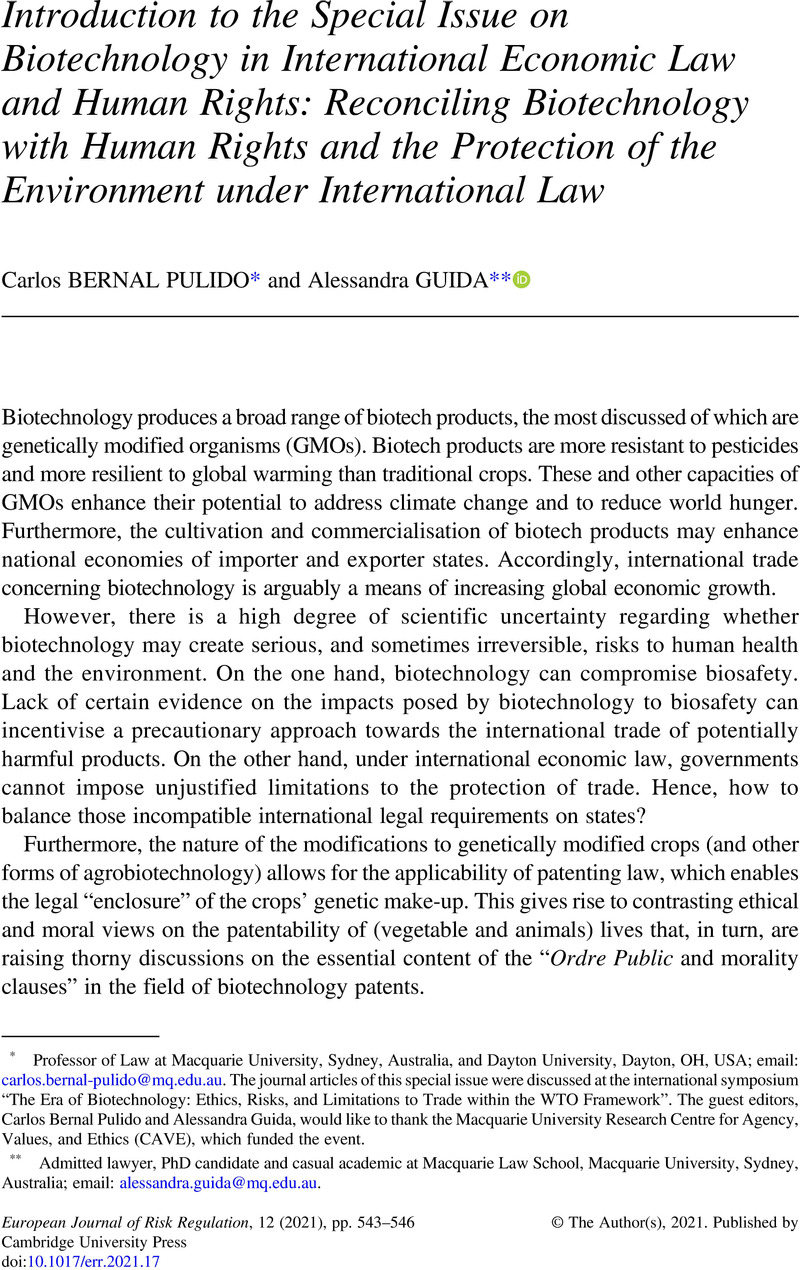Article contents
Introduction to the Special Issue on Biotechnology in International Economic Law and Human Rights: Reconciling Biotechnology with Human Rights and the Protection of the Environment under International Law
Published online by Cambridge University Press: 12 May 2021
Abstract

- Type
- Introduction
- Information
- European Journal of Risk Regulation , Volume 12 , Issue 3: Special Issue on Biotechnology in International Economic Law and Human Rights , September 2021 , pp. 543 - 546
- Copyright
- © The Author(s), 2021. Published by Cambridge University Press
Footnotes
The journal articles of this special issue were discussed at the international symposium “The Era of Biotechnology: Ethics, Risks, and Limitations to Trade within the WTO Framework”. The guest editors, Carlos Bernal Pulido and Alessandra Guida, would like to thank the Macquarie University Research Centre for Agency, Values, and Ethics (CAVE), which funded the event.
References
1 See especially T Megiddo, “Beyond fragmentation: on international law’s integrationist forces” (2019) 44(1) Yale Journal of International Law 4; NL Dobson, “Exploring the crystallization of ‘climate change jurisdiction’: a role for precaution?” (2018) 8(3–4) Climate Law 207; J Pauwelyn, “Bridging fragmentation and unity: international law as a universe of inter-connected islands” (2004) 25 Michigan Journal of International Law 903; R Howse, “The World Trade Organization 20 years on: global governance by judiciary” (2016) 27(1) European Journal of International Law 9; N Lavranos, “The Brazilian tyres case: trade supersedes health” (2009) 1 Trade, Law & Development 231; AJ Colangelo, “A systems theory of fragmentation and harmonization” (2016) 49 New York University of International Law & Policy 1; PS Rao, “Multiple international judicial forums: a reflection of the growing strength of international law or its fragmentation” (2004) 25 Michigan Journal of International Law 929; E Benvenisti and GW Downs, “National courts, domestic democracy, and the evolution of international law” (2009) 9 European Journal of International Law 59.
2 Megiddo, supra, note 1, 119–21.
3 G Hafner, “Pros and cons ensuing from fragmentation of international law” (2003) 25 Michigan Journal of International Law 849, 849–50.
4 A Peters, “Fragmentation and constitutionalism” in A Orford, F Hoffmann and M Clark (eds), The Oxford Handbook of the Theory of International Law (Oxford, Oxford University Press 2016) pp 1011, 1013–4; E-U Petersmann, “How to reconcile human rights, trade law, intellectual property, investment and health law? WTO dispute settlement panel upholds Australia’s plain packaging regulations of tobacco products” (2018) EUI Working Papers 1, 7.
5 JP Trachtman, The Future of International Law (Cambridge, Cambridge University Press 2013) p 224.
6 A Lang, “Twenty years of the WTO appellate body’s ‘fragmentation jurisprudence’” (2015) 14(3) Journal of International Trade Law & Policy 116, 122.
7 See especially, Megiddo, supra, note 1, 122; Hafner, supra, note 3, 861; M Koskenniemi, “Fragmentation of International Law: Difficulties Arising from the Diversification and Expansion of International Law – Report of the Study Group of the International Law Commission”, UN Doc A/CN.4/L.682 (13 April 2006) [492]; Trachtman, supra, note 5, 231–44; B Kingsbury, “Foreword: is the proliferation of international courts and tribunals a systemic problem?” (1998) 31 New York University Journal of International Law & Policy 679, 693; A Rachovitsa, “Fragmentation of international law revisited: insights, good practices, and lessons to be learned from the case law of the European Court of Human Rights” (2015) 28(4) Leiden Journal of International Law 863; M Koskenniemi and P Leino, “Fragmentation of international law? Postmodern anxieties” (2002) 15(3) Leiden Journal of International Law 553; AS Sweet and J Mathews, “Proportionality balancing and global constitutionalism” (2008) 1 Faculty Scholarship Series 1; T Kleinlein, “Judicial lawmaking by judicial restraint? The potential of balancing in international economic law” (2011) 12(5) German Law Journal 1141; SW Schill, “Cross-regime harmonization through proportionality analysis: the case of international investment law, the law of state immunity proposal” (2009) 16 Indiana Journal of Global Studies 483; A van Aaken, “Defragmentation of public international law through interpretation: a methodological proposal” (2009) 16(2) Indiana Journal of Global Studies 483.
8 Megiddo, supra, note 1, 125.
9 ibid, 123; Trachtman, supra, note 5, 237.
10 Megiddo, supra, note 1, 131. See also R Ferguson, The Right to Food and the World Trade Organization’s Rules on Agriculture: Conflicting, Compatible, or Complementary? (Leiden, Brill 2018) p 50.
11 The symposium “The Era of Biotechnology: Ethics, Risks, and Limitations to Trade within the WTO Framework” was proposed and organized by Carlos Bernal Pulido and Alessandra Guida at Macquarie Law School (Sydney, Australia) in September 2019. The event was funded by the Macquarie University Research Centre for Agency, Values, and Ethics (CAVE).
- 1
- Cited by




